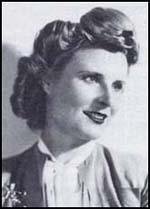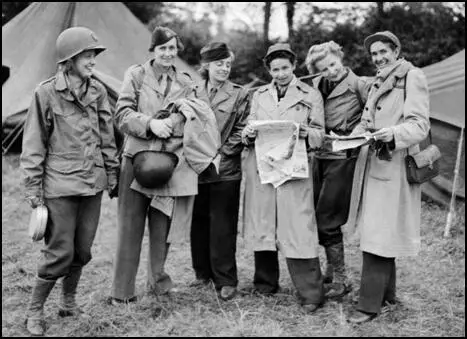Iris Carpenter

Iris Carpenter, the daughter of a cinema entrepreneur, was born in England in 1906. She became a journalist and worked as a film critic for the Daily Express. After her marriage to Charles Scruby she retired from journalism and gave birth to two children.
During the Second World War she joined the Daily Herald and wrote about the Blitz in London. When she was refused permission to cover the war in Europe, she moved to the United States and became a war correspondent with The Boston Globe.
Carpenter accredited to the First United States Army and arrived in France four days after the D-Day landings. Soon afterwards she got into trouble with the authorities after visiting the Cherbourg beachhead without a proper military escort. As a result Carpenter and other women reporters were placed under the command of the Public Relations Division and were told they could not visit the front-line. This directive was later changed and along with Tania Long, Ann Stringer and Catherine Coyne she was allowed to travel with the 1st Army and reported the war in France, Holland, Belgium and Germany.
Carpenter was also at Torgau when the Red Army and the US Army joined up for the first time. Jack Hazard of the The Boston Globe later commented: "She has made several scoops of real news that men missed, because of her daring, enthusiasm, originality and scorn of personal comfort." She was also with the troops when they liberated Buchenwald and Dachau.

According to Time Magazine: "Her reports from the front lines and hospitals in France and Germany described in graphic prose some of the bloodiest fighting on the Western front, including the Battle of the Bulge as well as the liberation of Nazi concentration camps; remained in the U.S., working for Voice of America."
After the war she married Colonel Russell F. Akers of the First United States Army. Her book, No Woman's World, was published in 1946.
Primary Sources
(1) Iris Carpenter, The Boston Globe (8th March, 1945)
Once in every journalist's life there is a story that is such a thrill and privilege to tell that anything and everything the getting costs is more than worthwhile. Such a story is today's.
Though it meant getting up at 4 a.m. to jeep through driving rain and spewing mud for 13 hours, getting pinned down under .88 fire, having the wind screen of my jeep splintered by shellfire, getting sniped at, and finally, having crossed the Rhine I am unable to tell you anything but the barest bones of narrative until the security blackout is lifted somewhat. I can only promise that when detail is possible, it will be one of the greatest stories of all time, not just of this war.
It began yesterday when, driving through toward the Rhine River south of Cologne, we reached the banks to find the situation was not as we had expected to find it.
Resistance was not the type we expected-it was such, in fact, that the troops called upon their commanding officer for a discussion. He heard what they had to tell him. He put his field telephone back in its leather case with a terse: "I'll be right down, boys."
The conference - in the street of as picturesque a Rhine village as ever decorated a wine label - lasted a matter of minutes. Then the first Allied soldiers to set foot on the far banks of the blue river, which is anything but blue in March, whatever it may be at other times of the year, were on their way to take the first German village on the eastern shore.
(2) Iris Carpenter, No Woman's World (1946)
He was lying on his face in a gateway with his legs tucked into his muddy combat boots that had scuffed the sand a bit before they stayed still. A coat over the top of him had sagged into the contourless, sun-dried mush. Hopping around him was a large, tame, white rabbit that had somehow escaped from the general holocaust. Browsing beside them was a donkey. Had it been his own home, the futility of it might have seemed less pitiably futile. But the few yards of gateway
this man had fought and died so untidily meant nothing to him. And for those few yards that could never benefit or matter much to his own country, or to those dear to him and to whom he was dear, he had to die.
(3) Iris Carpenter, No Woman's World (1946)
Time was taken out to bury the men, but carcasses of cattle were everywhere. I don't know why the sight of a flock of sheep bowled stiffly on their sides, or a cow with the soft, flabby folds of her neck stretched taut to the sky, or a horse with his four legs jutting from a bloated belly, should seem more sadly to highlight the horridness of war than anything it
does to men. I know only that it did. Maybe it's because animals are so unresponsible for it all.
(4) Jack Hazard, The Boston Globe (20th March, 1945)
She has made several scoops of real news that men missed, because of her daring, enthusiasm, originality and scorn of personal comfort.
(5) Carlyle Holt, The Boston Globe (19th April, 1945)
For months she was one of a small group of women correspondents who fought for their right to use the press camps on the same basis as the male correspondents and she finally shared in the victory for feminine rights. Since that victory she has stayed regularly with 1st Army.
(6) Time Magazine (9th September, 1946)
When U.S. trucks and tanks hit Omaha Beach, says Iris Carpenter, drivers "cried and vomited" as they crunched over the bodies of G.I.s fallen in the first infantry waves. It was sickening and terrible, but the beachhead held firm.
Blonde, British-born Iris Carpenter, thirtyish, BBC commentator and war correspondent (London Daily Herald, Boston Globe), says that she held firm, too. Although ready to grant from the start that it was no woman's world, she thought a "newspaper girl" had as much right to report what was happening as anyone else. Correspondent Carpenter stayed until V-E day and beyond, ended up with a new feeling of authority on military strategy, a shattered eardrum (enemy bombing) and a fiancé: Colonel Russell F. Akers Jr. of the U.S. First Army staff.
Much of No Woman's World reads about as a woman's war report might be expected to read: human-interest stories, hard-boiled anecdotes, Perils-of-Pauline asides. In field hospitals Correspondent Carpenter saw "the hideous mess which high-explosive makes of human flesh." In newly liberated Paris she lived on "K rations, cognac and champagne." On the Rhine she rushed over the newly captured Remagen Bridge while MPs shouted, "Keep ten paces between you and the next guy—it's hot around here."
Correspondent Carpenter also includes a critical tactical narrative of the fighting from D-day to the end. Having had access (she does not say through whom, but it is a fair guess) to First Army staff documents, she notes that First Army G-2 had the "first inkling" of Rundstedt's Ardennes offensive weeks before it began, but that Bradley's Twelfth Army group did not act on the information. Her conclusion: it was closer to "complete catastrophe . . . than any Allied commander would ever care to admit."

